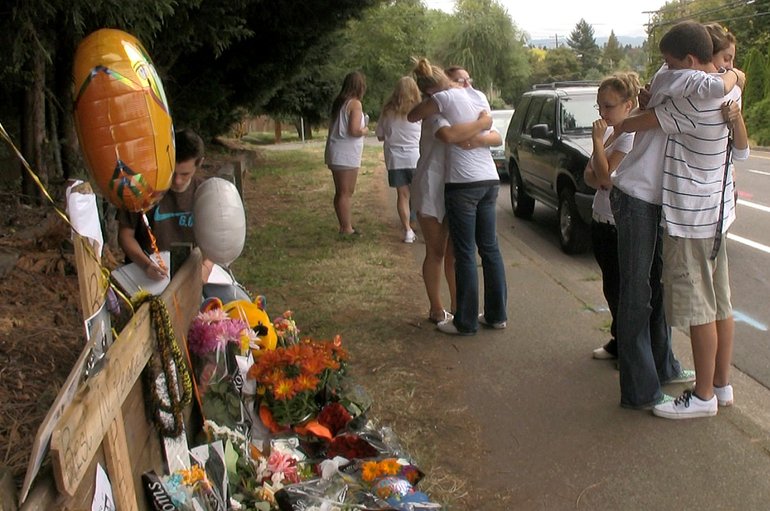Texting, talking on cell phone while driving a safety hazard, teacher’s death and research show
Many say contact with friends more important than safety
Nearly every teen does it. Most admit it’s dangerous. Yet, many agree — barring a collision or a ticket — they have no intention of stopping.
Texting and talking on cell phones while driving may make people more likely to be in or cause a traffic collision. But several local high-schoolers said they don’t think their cell phones will interfere with their abilities to operate a vehicle safely.
“It is a big distraction, but sometimes you think you can get away with it,” said Whittney Lange, a Heritage High School junior. “You think, ‘It happened to that person, but it won’t happen to me.'”
And, Lange said, in many cases, the desire to stay in touch with friends trumps safety — and the law.
Texting and talking on cell phones, without a hands-free device, is against the law in Washington. But it’s a secondary offense, meaning police officers cannot pull drivers over for using their phones.The driver must also be committing another violation.
Several area students said they don’t believe officers enforce the law but conceded that if they got a pricey ticket, they’d probably reconsider texting while driving. Until then, though, they won’t set their phones down unless they see a police officer.
“I think it should be illegal to text but not talk on your phone,” Heritage senior Cody Wood said. “You can function while talking, but when you’re looking down every five seconds you’re more eligible for a crash.”
Dangerous distractions
Many teens agreed with Wood, saying trying to type or read a message on a small cell phone screen is more dangerous than talking on the phone, fiddling with a radio dial or driving with a car full of people.
“I know I try to stay away from it, but sometimes you’re just so tempted to see what that message says,” Heritage senior Dalila Zelkanovic said.
And some teens, who said they’ve been texting and driving since they received their licenses, claim to have perfected the multi-tasking and take measures to keep their eyes on the road — and their phones.
For instance, one 17-year-old said he can feel the buttons on his phone and text without looking at the screen. A local 16-year-old said she only reads text messages while driving and waits until she’s stopped at a red light to respond. Another 17-year-old said he refrains from texting while driving on highways and freeways because its too dangerous. And another 16-year-old said he balances his phone on the top of the steering wheel so he can see the screen and still gaze at the road ahead.
‘Everybody does it’
Teen drivers aren’t the only ones guilty of violating the law while driving, and they know it.
“I think everybody does it,” said Zelkanovic, 17. “I’ve actually seen a teacher and she was reading something (while driving).”
Several teens said they’ve seen police officers on their phones and claim it’s unfair for officers to ticket drivers doing the same thing. However, officers and other emergency responders are exempt from the state law regarding cell phones.
The young drivers also take notice when their parents tell them not to text and talk on their phones but do it themselves.
“I tell parents the first night at orientation, ‘They are going to do what they see you do,'” said David Gile, a driving instructor and owner of Confident Driving Instruction. “We do need to set a better example.”
Texting tragedy
Some teens think educators need to do more to make young drivers realize the danger of texting and driving. Hudson’s Bay seniors Kayla Walker and Stephanie Suda said they think showing students in driver’s education courses graphic photos and videos of crashes caused by cell phone distractions would scare students straight.
Gile said he teaches students about all distractions, not just cell phones, in his courses and explains the laws regarding phones. He also offers statistics about the causes of crashes and the increased risks for inexperienced drivers.
But Heritage senior Lili Garcia believes even scaring teens might not be enough to make them put down their phones while behind the wheel.
“I think people would have to experience a tragedy to stop,” said Garcia, 18. “I think I would have to experience something really bad. I think that’s what always happens, it takes something bad happening.”
That is exactly what happened last fall when Hudson’s Bay teacher Gordon Patterson was struck by a car while riding his bike and killed. The driver, a former student, Antonio Cellestine, 18, was sending and receiving text messages while driving, according to court documents.
While Patterson’s death devastated many of his students and the high school community, several Bay students said the fact that Cellestine was texting when he hit Patterson didn’t seem to affect students — or deter them from doing it.
“Nobody talked about the texting as a cause,” said Walker, 17.
Other students concede text messaging probably played a role in the crash but doubt it was the sole reason for the collision.
But Lange, a 16-year-old, doesn’t doubt the danger when teens, cell phones and vehicles are involved.
“It’s high-schoolers, they’re always on their phones,” she said. “It can be deadly.”
Marissa Harshman: 360-735-4546 or marissa.harshman@columbian.com.




